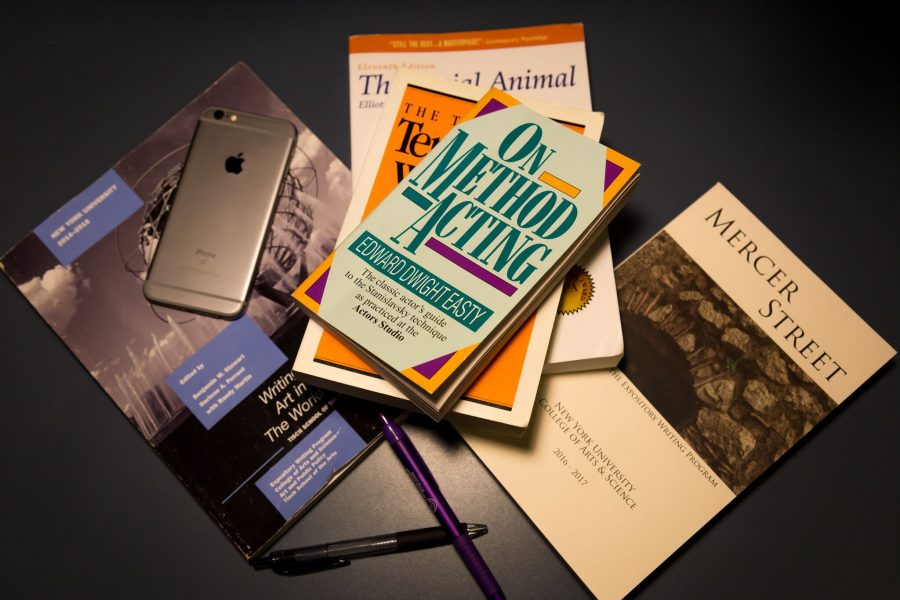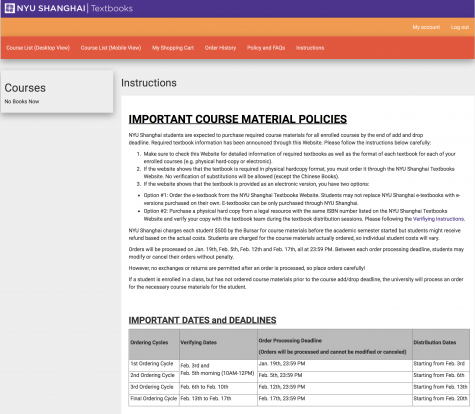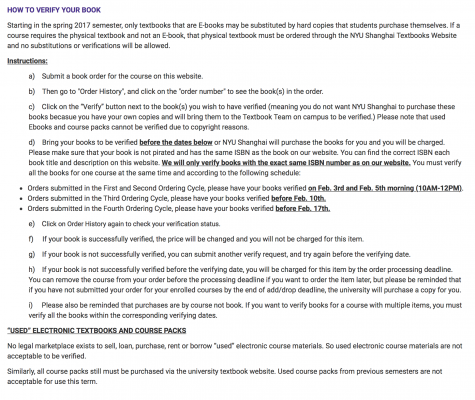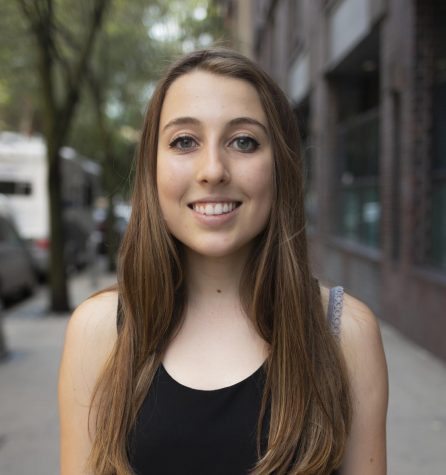Students Read Between the Lines of NYUSH Textbook Policies
NYU Shanghai students are outraged at the institute’s expensive textbook policies.
January 30, 2017
NYU Shanghai implements a unique textbook policy, restricting how students buy textbooks. NYUSH’s Student Council has grappled with the administration over altering the policies, but the administration says legal barriers prevent reform.
The official policy requires students to either order the e-textbook from the NYUSH’s textbook website or legally purchase a physical copy and verify it with the university.
“If the website shows that the textbook is required in physical hardcopy format, you must order it through the NYU Shanghai Textbooks Website,” the policy reads. “No verification of substitutions will be allowed (except the Chinese Books).”
This policy prevents students from purchasing textbooks illegally or pirating the books online. NYUSH predominantly uses e-textbooks, and a number of students, who prefer physical copies, illegally print textbooks.
NYUSH junior Nofar Hamrany has voiced his concerns to the student leadership platform for three years. Hamrany said that acquiring textbooks, according to campus policies, has caused financial concerns for students.
The policy states, “NYU Shanghai charges each student $500 by the Bursar for course materials before the academic semester started but students might receive refund based on the actual costs.”
Hamrany said that NYUSH has since removed this flat $500 fee and replaced it with a verification policy, which students also oppose because it only applies to NYUSH — other American universities in Shanghai are more flexible with their textbook policies. Verification requires students to buy university-approved books and then confirm their legal acquisition. If this process is not completed, the university purchases the book on the student’s behalf.
Hamrany also said that the legal issues the university cites should be questioned, because they serve the university more than its students.
“If I as a student buy an illegal book, it has nothing to do with the school,” Hamrany said.
Hamrany believes NYUSH is worried about how it is perceived in the United States. The economic repercussions should not affect students.
But, John Robertson, Assistant Provost for Academic Affairs, said that many constraints prevent the university from loosening its policies. Two major roadblocks include NYUSH lacking the license to be a textbook vendor and the university being under government scrutiny.
“One of the reasons that we have to do what we do is that unlike New York — where there are so many different options for students to get books and the university acts as almost a bystander to the process — we have reputational risk involved if we removed ourselves from the process and told students to get books on their own,” Robertson said.
Robertson said that the university does not want to violate U.S. copyright laws, since publishers hold the university liable if students are caught illegally accessing textbooks.
“There are stories in the New York Times and papers like [Washington Square News] who look at the labor practices in China and how NYUSH relates to that,” Robertson said. “We just want to make sure that if someone in New York or at The New York Times decides they want to write an article about NYUSH and its relationship to U.S. copyright law that we are actually following that copyright law.”
NYUSH sophomore Hobin Kim, Vice President of NYUSH’s Student Government, said that while things have definitely improved during his time dealing with the textbook policy issues, students will never be completely satisfied. Yet, while some students are upset with the policies, Kim does not think this is a unanimous sentiment.
“It’s one of those things where students just complain, even though the admin is trying a lot to improve the quality of life in our school,” Kim said. “For some people, they just whine about it, but for some people, they just don’t care.”
Kim said that he believes there is rationale within the current system and that two main issues prevent NYUSH from becoming a legal book vendor: the lack of space for a bookstore and the aforementioned licensing issue. When he explains this to other students, he said that they are mostly able to empathize with the administration. However, he also thinks this understand- ing could stem from students’ general affluence.
“NYUSH is the first jointly established university by America and China, so we are very careful in this situation — we’re not really sure if we’re going to be existing in 10 or 20 years, because the Chinese government is looking at us,” Kim said.
A version of this article appeared in the Monday, Jan. 30 print edition. Email Jemima McEvoy at [email protected].



























































































































































